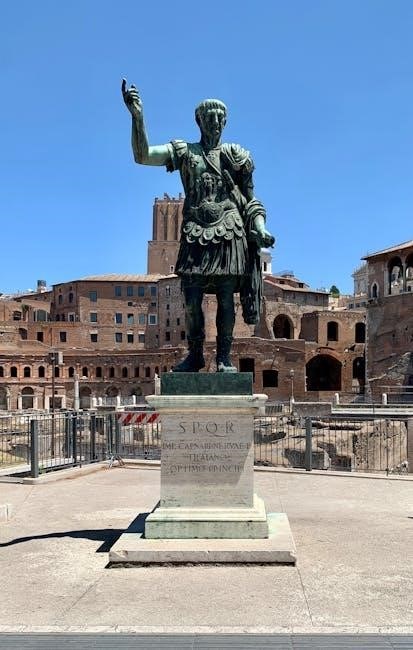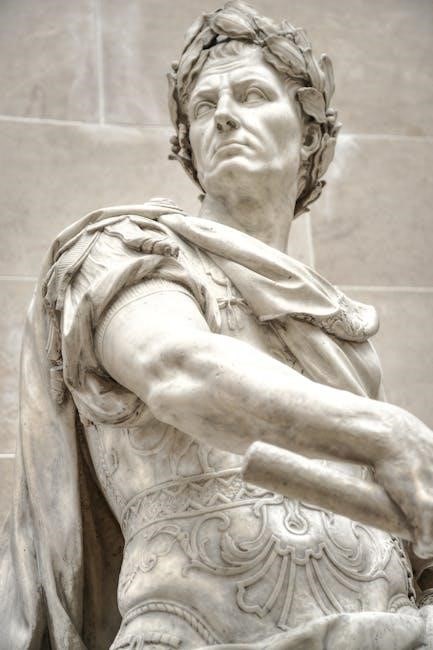William Shakespeare’s Julius Caesar is a tragic drama exploring ambition‚ power‚ and betrayal. This PDF summary provides a concise overview of the play‚ highlighting key themes‚ characters‚ and historical context‚ making it an essential resource for understanding the timeless classic.
Overview of the Play
Julius Caesar is a tragic drama by William Shakespeare‚ set in ancient Rome during the late Republic. It explores themes of ambition‚ power‚ and betrayal through the conspiracy against Julius Caesar. The play follows Caesar’s rise‚ his assassination by Brutus and Cassius‚ and the ensuing power struggle. Mark Antony’s loyalty and political cunning drive the plot‚ leading to civil war and the downfall of the conspirators. The drama examines human nature‚ fate‚ and the consequences of political ambition.
Importance of the Summary
A PDF summary of Julius Caesar provides a concise and accessible guide to understanding the play’s themes‚ characters‚ and historical context. It aids students and readers in grasping the complexities of Shakespeare’s tragedy‚ highlighting key plot points and character motivations. The summary is invaluable for quick reference‚ study‚ and analysis‚ offering insights into the timeless themes of ambition‚ loyalty‚ and power that resonate beyond the ancient Roman setting.

Historical Context of Julius Caesar
Set in 44 B.C.‚ the play reflects Rome’s political turmoil‚ with Caesar’s rise to power sparking fears of tyranny and prompting his assassination by senators.
The Life of Julius Caesar
Gaius Julius Caesar (100–44 B.C.E.) was a renowned Roman general‚ statesman‚ and leader who transformed the Roman Republic. Rising to power through alliances like the First Triumvirate‚ Caesar expanded Rome’s territories through conquests in Gaul and Britain. His victories and popularity‚ however‚ led to growing tensions with the Senate‚ fearing his ambition. Assassinated on the Ides of March in 44 B.C.E.‚ Caesar’s death marked the end of the Republic and the rise of the Roman Empire under his adopted son‚ Octavian.
The Roman Republic in 44 B.C.
In 44 B.C.‚ Rome was a republic in turmoil‚ marked by political instability and social unrest. The once-stable government faced power struggles between senators and military leaders like Caesar. His rise to dominance threatened the Senate‚ leading to fears of monarchy. The Republic’s structure‚ with elected officials and checks on power‚ was on the brink of collapse‚ setting the stage for Caesar’s assassination and the eventual rise of the Empire under his successors.

Political Climate of Rome in the Play
Rome’s political climate was volatile‚ marked by intense power struggles and mistrust. Senators feared Caesar’s rising authority‚ believing it threatened the Republic’s stability and their own influence.
Rivalries and Power Struggles
The play portrays intense rivalries among Roman leaders‚ with Cassius manipulating Brutus to join the conspiracy against Caesar. Cassius resents Caesar’s growing power‚ fearing it could lead to tyranny. Brutus‚ driven by idealism‚ believes assassinating Caesar will restore Roman honor and prevent monarchy. Meanwhile‚ Mark Antony’s loyalty to Caesar intensifies the conflict‚ showcasing the clash between personal ambition and political ideals. These power struggles ultimately destabilize Rome’s fragile political balance.
The Role of the Senate
The Senate in Julius Caesar serves as a symbol of Roman authority‚ yet its influence wanes as Caesar’s power grows. Senators fear Caesar’s rise‚ perceiving him as a threat to their traditional governance. The assassination plot is orchestrated by senators like Brutus and Cassius‚ who believe killing Caesar will restore the Senate’s control. However‚ their actions backfire‚ leading to chaos and the eventual rise of the Empire‚ highlighting the Senate’s declining relevance in Roman politics.

Plot Summary of Julius Caesar
Julius Caesar’s tragic tale begins with his triumphant return‚ sparks a deadly conspiracy‚ his assassination‚ Mark Antony’s rise‚ and a civil war ending in Caesar’s enduring legacy.
The play opens with Julius Caesar’s triumphant return to Rome after defeating Pompey. Celebrations unfold during the Lupercal festival‚ where a soothsayer warns Caesar to beware the Ides of March. Meanwhile‚ Cassius‚ fearing Caesar’s rising power‚ begins recruiting conspirators‚ including Brutus‚ by appealing to his sense of honor and republican ideals. This act sets the stage for the unfolding conspiracy against Caesar‚ driven by ambition and political rivalry.
Act II: The Assassination of Caesar
Act II centers on the conspiracy unfolding as Brutus‚ swayed by Cassius‚ joins the plot against Caesar. A soothsayer warns Caesar to “beware the Ides of March‚” while Calpurnia’s ominous dream further heightens tension. Despite these warnings‚ Caesar attends the Senate‚ where the conspirators‚ led by Brutus and Cassius‚ stab him to death. Caesar’s last words‚ “Et tu‚ Brute?” reflect his shock and betrayal by his friend Brutus‚ marking a pivotal moment in the play.
Act III: Aftermath and Power Shift
Act III explores the chaotic aftermath of Caesar’s assassination. Mark Antony delivers a powerful funeral oration‚ turning public opinion against the conspirators. Brutus and Cassius justify their actions but face growing opposition. Meanwhile‚ Antony‚ Octavius‚ and Lepidus form an alliance to avenge Caesar’s death‚ setting the stage for civil war. The act highlights the shifting political landscape and the escalating tensions between the conspirators and Caesar’s loyalists.
Act IV: Civil War and Battle
Act IV depicts the outbreak of civil war as Brutus and Cassius clash with Antony‚ Octavius‚ and Lepidus. The conspirators face internal conflicts‚ while Antony and Octavius gain the upper hand through strategic alliances. The Battle of Philippi becomes the decisive confrontation‚ where Brutus and Cassius are defeated. Their deaths mark the end of the Republic and the rise of the Empire‚ as Antony and Octavius emerge victorious‚ reshaping Rome’s political future.
Act V: Conclusion and Reckoning
Act V concludes with the aftermath of the Battle of Philippi‚ where Brutus and Cassius are defeated by Antony and Octavius. Brutus‚ realizing their cause is lost‚ takes his own life‚ followed by Cassius. Antony delivers a eulogy for Brutus‚ acknowledging his noble intentions. The play ends with Antony and Octavius triumphant‚ signaling the end of the Roman Republic and the rise of the Empire. Justice and fate are fulfilled‚ closing the tragic cycle.

Main Characters in Julius Caesar
Julius Caesar‚ Brutus‚ Cassius‚ and Mark Antony are central figures‚ each embodying distinct traits like ambition‚ loyalty‚ and betrayal‚ driving the play’s tragic narrative and political turmoil.
Julius Caesar: The Tragic Hero
Julius Caesar‚ a celebrated Roman general and statesman‚ embodies the archetype of a tragic hero. His ambition and belief in destiny lead to his rise‚ but also to his downfall. Despite his triumphs‚ Caesar’s refusal to heed warnings‚ like the soothsayer’s prophecy‚ underscores his tragic flaw of hubris. His assassination‚ orchestrated by those he trusted‚ highlights the consequences of unchecked power and ambition‚ cementing his legacy as a tragic figure in Shakespeare’s drama.
Brutus: The Idealistic Conspirator
Brutus‚ a noble Roman senator‚ joins the conspiracy against Caesar driven by his idealistic belief in preserving the Roman Republic. His internal conflict between loyalty to Caesar and duty to Rome is central to his character. Brutus’s decision to assassinate Caesar stems from a misguided sense of honor and fear of tyranny‚ yet his actions ultimately lead to chaos and regret‚ showcasing the complexity of his moral motivations and tragic downfall.
Cassius: The Mastermind of the Conspiracy
Cassius‚ a cunning and ambitious senator‚ orchestrates the plot against Julius Caesar‚ leveraging his intellect and manipulation to recruit Brutus and others. His resentment towards Caesar’s rising power and perceived tyranny fuels his actions. Cassius’s strategic mind drives the conspiracy‚ but his lack of charisma and emotional depth contrasts with Brutus’s idealism‚ making him a compelling yet flawed figure in the play’s political and moral landscape.
Mark Antony: The Loyalist
Mark Antony emerges as Caesar’s devoted ally and a shrewd politician‚ effortlessly navigating Rome’s treacherous political waters. His impassioned funeral speech transforms public sentiment‚ turning the tide against the conspirators. Antony’s loyalty and strategic brilliance make him a pivotal figure in the play’s unfolding drama‚ as he transitions from mourning Caesar to becoming a key player in the power struggle that follows his death.

Themes in Julius Caesar
The play explores themes of ambition‚ power‚ loyalty‚ and betrayal‚ highlighting the clash between personal honor and political necessity‚ with fate and prophecy underscoring the tragedy.
Ambition and Power
In Julius Caesar‚ Shakespeare examines the destructive nature of ambition and the pursuit of power. Caesar’s rise to dominance sparks fear among senators‚ who view his growing influence as a threat to Rome’s republic. Brutus and Cassius‚ driven by their own ambitions and desire to preserve Roman ideals‚ conspire against Caesar. Meanwhile‚ Caesar’s tragic downfall highlights the consequences of unchecked ambition‚ while Antony’s subsequent rise demonstrates how power shifts can reshape political landscapes. The play underscores the timeless struggle between personal ambition and collective stability.
Loyalty and Betrayal
Loyalty and betrayal are central themes in Julius Caesar‚ as characters grapple with conflicting allegiances. Caesar’s trust in Brutus‚ a close friend‚ is shattered by Brutus’s betrayal‚ while Antony remains steadfastly loyal to Caesar even after his death. Brutus justifies his actions as a sacrifice for Rome’s freedom‚ yet his betrayal ultimately leads to chaos. The play explores how loyalty can be both noble and destructive‚ depending on the motives behind it.
Fate and Prophecy
Fate and prophecy drive the narrative of Julius Caesar‚ as characters confront destiny’s inevitability. The soothsayer’s warning to “Beware the Ides of March” underscores Caesar’s doomed fate‚ while Calpurnia’s nightmares amplify the sense of impending tragedy. Shakespeare uses prophecy to heighten tension‚ illustrating how characters’ attempts to defy fate often accelerate their downfall. The interplay between free will and destiny shapes the play’s tragic outcome‚ leaving audiences contemplating the power of foresight and inevitability.

Historical Accuracy and Artistic Liberties
Shakespeare’s Julius Caesar blends historical facts with creative liberties‚ adapting real events for dramatic impact while maintaining the essence of Caesar’s assassination and its aftermath.
Shakespeare’s Adaptation of History
Shakespeare’s Julius Caesar draws heavily from historical records but incorporates artistic liberties to enhance drama. While the core events‚ such as Caesar’s assassination and its aftermath‚ align with history‚ characters like Brutus and Cassius are fleshed out for emotional depth. The soothsayer’s warning and Caesar’s dismissal of it are dramatized for tension. Shakespeare balances historical accuracy with creative storytelling to explore themes of ambition and betrayal‚ making the play both authentic and engaging.
Key Differences Between History and Drama
While Shakespeare’s Julius Caesar mirrors historical events‚ artistic liberties were taken to enhance the narrative. The play condenses timelines and alters character motivations for dramatic effect. For instance‚ Brutus and Cassius were older in reality‚ and Caesar’s assassination was less theatrical. Shakespeare also added scenes‚ like the soothsayer’s warning‚ to build tension. These creative adjustments emphasize themes of ambition and fate‚ distinguishing the play from a purely historical account.
Significance of Key Scenes
Key scenes in Julius Caesar highlight pivotal moments that shape the plot and themes. Caesar’s assassination and Antony’s funeral speech are central‚ illustrating power dynamics‚ betrayal‚ and emotional manipulation.
Caesar’s Assassination
Caesar’s assassination is a pivotal moment in the play‚ occurring on the Ides of March. Conspirators‚ led by Brutus and Cassius‚ stab Caesar in the Senate‚ fearing his rising power. The soothsayer’s warning to “beware the Ides of March” adds dramatic irony. Caesar’s death sparks a power struggle‚ leading to the downfall of the conspirators and the rise of Antony and Octavius. This scene is a masterful depiction of betrayal‚ fate‚ and political upheaval.
Mark Antony’s Funeral Speech
Mark Antony’s funeral speech is a masterclass in rhetoric and emotional manipulation. Delivering Caesar’s eulogy‚ Antony skillfully turns the crowd against the conspirators‚ using Caesar’s wounds and will to incite rage and vengeance. His repeated refrain of “Brutus is an honorable man” becomes a biting irony. The speech showcases Antony’s loyalty to Caesar and his political cunning‚ setting the stage for the power struggles that follow.

Aftermath and Consequences
The assassination of Julius Caesar led to a power struggle‚ civil war‚ and the eventual fall of the Roman Republic. His death marked the end of republican rule‚ paving the way for the rise of the Roman Empire under his adopted son‚ Octavian.
The Fall of the Republic
The assassination of Julius Caesar sparked a series of events leading to the collapse of the Roman Republic. Power struggles among Caesar’s successors‚ including Octavian‚ Antony‚ and Lepidus‚ further destabilized the political landscape. The Republic’s institutions‚ already weakened by internal conflicts‚ crumbled as civil wars and shifting alliances dominated Rome. Ultimately‚ the rise of the Roman Empire under Augustus marked the end of republican governance‚ transitioning Rome into a new era of imperial rule.
Rise of the Empire
Following Caesar’s assassination‚ the power vacuum led to the rise of the Roman Empire. Octavian‚ Caesar’s adopted son‚ emerged victorious after defeating Antony and Cleopatra at Actium. He established the Principate‚ marking the end of the Republic and the beginning of imperial rule. As Augustus‚ he brought stability and centralized authority‚ reshaping Rome’s governance and laying the foundation for centuries of imperial dominance‚ ending the Republic’s era and initiating a new political order.

Modern Relevance and Adaptations
Shakespeare’s Julius Caesar remains relevant today‚ with its themes of ambition and power reflecting modern political struggles. Stage and screen adaptations continue to captivate audiences‚ ensuring its timeless appeal.
Political Parallels in Modern Times
The timeless themes of Julius Caesar resonate in contemporary politics‚ as modern leaders grapple with ambition‚ power struggles‚ and betrayal. A notable adaptation‚ such as a New York production depicting Caesar as a Trump-like figure‚ underscores the play’s relevance‚ sparking debates on democracy and authoritarianism. Shakespeare’s exploration of human nature and leadership continues to mirror modern political dilemmas‚ reminding us of the enduring relevance of these universal themes in today’s world.
Stage and Screen Adaptations
Shakespeare’s Julius Caesar has been adapted into numerous stage productions and films‚ each offering unique interpretations. The Public Theater’s 2017 production controversially portrayed Caesar as a Trump-like figure‚ sparking intense debate. Screen adaptations‚ such as the 1953 film starring Marlon Brando‚ have also brought the play to life. These adaptations highlight the enduring relevance of the play’s themes‚ ensuring its continued impact across generations and mediums.
Julius Caesar remains a timeless exploration of ambition‚ betrayal‚ and power‚ offering profound insights into human nature and political intrigue‚ ensuring its enduring relevance in literature.
Final Thoughts on Julius Caesar
Shakespeare’s Julius Caesar masterfully explores themes of ambition‚ betrayal‚ and fate‚ offering timeless insights into human nature and political power. The tragic downfall of Caesar serves as a cautionary tale about the dangers of unchecked ambition and the unpredictable nature of human loyalty. Through its rich characters and gripping plot‚ the play remains a profound commentary on leadership and morality‚ continuing to resonate with audiences today. Its enduring relevance underscores Shakespeare’s genius in crafting universal truths.
Impact of the Play on Literature
Julius Caesar has profoundly influenced Western literature‚ shaping political dramas and explorations of human ambition. Its intricate characters and moral dilemmas continue to inspire writers and adaptations. The play’s timeless themes of power‚ loyalty‚ and fate remain central to literary studies‚ solidifying its place as a cornerstone of dramatic storytelling. Its enduring influence reflects Shakespeare’s mastery in crafting narratives that resonate across generations and cultures‚ making it a foundational work in literary history.

Resources for Further Reading
Explore PDF summaries and academic guides for deeper insights into Julius Caesar. Visit SparkNotes and Shakespeare.org for detailed analyses and study materials.
Recommended PDF Summaries and Analyses
Discover comprehensive PDF summaries of Julius Caesar for in-depth analysis. Resources like SparkNotes and Shakespeare.org offer detailed breakdowns of themes‚ characters‚ and historical context. These guides are ideal for students and scholars seeking to enhance their understanding of the play. Additionally‚ academic PDFs provide critical insights and essays‚ perfect for advanced study or research purposes.
Academic Sources and Study Guides
For deeper analysis‚ consult reputable academic sources like SparkNotes and Shakespeare.org‚ which offer detailed study guides on Julius Caesar. University publications and scholarly articles provide insightful essays and critiques. Additionally‚ resources from institutions like the Seattle Shakespeare Company include comprehensive study guides‚ perfect for academic research and analysis of the play’s themes‚ characters‚ and historical significance.
